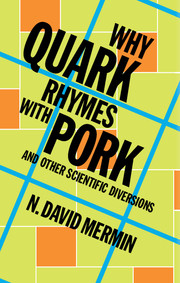Book contents
- Frontmatter
- Dedication
- Contents
- Preface
- Part One Reference Frame Columns, Physics Today 1988–2009
- Part Two Shedding Bad Habits
- Part Three More from Professor Mozart
- Part Four More to be Said
- Part Five Some People I've Known
- 39 My life with Fisher, lecture, Rutgers University, 2001
- 40 My life with Kohn, 2003, updated 2013
- 41 My Life with Wilson, lecture, Cornell University, 2014
- 42 My life with Peierls, unpublished lecture, Santa Barbara, 1997
- Part Six Summing it Up
- Index
39 - My life with Fisher, lecture, Rutgers University, 2001
from Part Five - Some People I've Known
Published online by Cambridge University Press: 05 January 2016
- Frontmatter
- Dedication
- Contents
- Preface
- Part One Reference Frame Columns, Physics Today 1988–2009
- Part Two Shedding Bad Habits
- Part Three More from Professor Mozart
- Part Four More to be Said
- Part Five Some People I've Known
- 39 My life with Fisher, lecture, Rutgers University, 2001
- 40 My life with Kohn, 2003, updated 2013
- 41 My Life with Wilson, lecture, Cornell University, 2014
- 42 My life with Peierls, unpublished lecture, Santa Barbara, 1997
- Part Six Summing it Up
- Index
Summary
Many years ago I was writing a talk, “My Life with Landau,” for a conference commemorating the 80th anniversary of the birth of the great L. D. Landau [1]. I knew I was going to have to deliver it before an audience that included Michael Fisher, and I found, to my distress, that as I sat there at the keyboard the image of Michael kept intruding on my thoughts, questioning my assumptions, denouncing mean field theories, and otherwise disrupting my concentration, in the way that we have all come to know and love. Finally, to chase him away, I wrote “Some day I would like to give a talk on ‘My Life with Fisher’” and strangely enough, that got rid of him. But I've known ever since that the time would come when I would have to pay for that liberating moment.
I first heard of Michael Fisher in 1963, at the beginning of my postdoctoral year at La Jolla. I met another young postdoc, Bob Griffiths, and in response to the intellectual sniffing out that goes on on such occasions, Griffiths let it be known that what he was up to was proving that the free energy of a spin system exists. “That it what?” I said. “That it exists,” said Griffiths firmly. “I'm using some ideas I got from Michael Fisher.” Well, I thought, this Griffiths seems like a nice guy anyway. And I decided that this mentor of his, this Fisher, must be a man with deep philosophical interests—a sort of Plato of thermodynamics.
I didn't hear of Fisher again until I got to Cornell in 1964 and Ben Widom told me one day that Michael Fisher was coming for a visit. “That's nice,” I said, and remembering him as Griffiths’ mentor, looked forward to meeting such a quiet and contemplative man. The visit lasted over 20 years, and turned into the most wonderful thing that has happened to me in my professional life.
Let me trace for you Michael's trajectory through the acknowledgments sections of my publications. He first shows up at the end of the 1966 paper in which Herbert Wagner and I give our version of Hohenberg's theorem.
- Type
- Chapter
- Information
- Why Quark Rhymes with PorkAnd Other Scientific Diversions, pp. 321 - 330Publisher: Cambridge University PressPrint publication year: 2016



